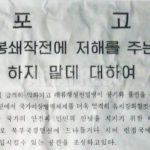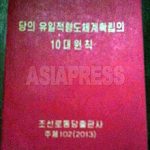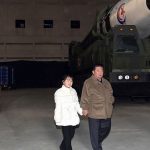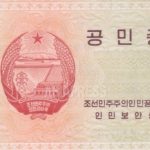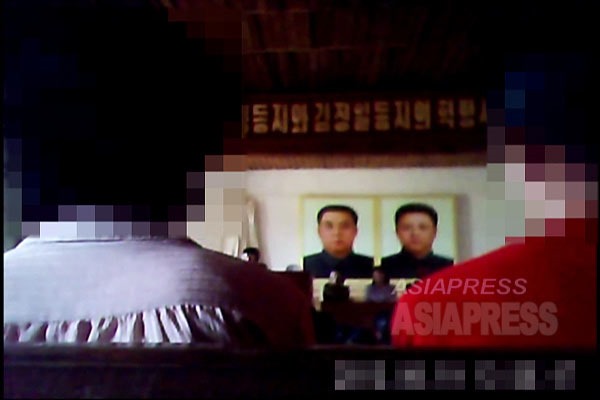
Over the past several years, many North Koreans have chosen to commit suicide either individually or with their families due to the desperately poor economic conditions they faced. Concerned over the impact of these suicides, the authorities have called “suicide a traitorous act of betrayal against the State,” and has even called for the punishment of bereaved families and relatives. Workers’ Party cadres are going to workplaces to lecture laborers about suicide and the punishments that await the relatives of those who commit suicide. (KANG Ji-won)
◆ Unmarried mother commits suicide with three-year-old child in September
North Korea’s government has long considered suicide to be an act of opposition toward the regime and society. The regime believes that unhappy people do not exist in a society under the rule of the Workers’ Party and the Monolithic Leadership System.
In early September, ASIAPRESS was informed through a reporting partner in Yanggang Province about an unfortunate event that occurred in Unhung County: A mother committed suicide along with her three-year-old child. The mother could no longer feed her thin, weak child, who was suffering from malnutrition. She was unable to get medical care for her child, either. Ultimately, the mother attempted suicide by digesting opium. Her child was found dead four days after their mother committed suicide.
After the start of the COVID-19 pandemic in 2020, North Korea’s economic situation deteriorated quickly, leading urban dwellers to commit suicides individually and along with their families. The authorities responded to this spate of suicides by saying that “spreading information about starvation deaths and suicides is a traitorous act,” even mentioning that people could be punished. Nonetheless, the suicide of the mother and her child in September spread like wildfire.
◆ Authorities openly warn laborers that “suicide is an anti-state act” and that “relatives as far away as fourth cousins will face political disadvantages”
Perhaps upset over the continued suicides, the authorities moved to have Workers’ Party cadres visit factories and other workplaces in September to conduct lectures harshly criticizing suicides as “traitorous acts.” “A,” a reporting partner in Yanggang Province, gave ASIAPRESS an account of one of these lectures held at a major company in the province:
“A cadre from the party’s propaganda department told us that ‘suicide is committed by those who have no hope that socialism will achieve victory given they are corrupt, selfish people who believe in the ideology of capitalism.’”
“A” provided an even more detailed account of what the official told those attending the lecture:
・Despite the fact that laborers at the company have attained great achievements through devoted efforts and struggles to protect the DPRK, the last bastion of socialism, and that socialism is gaining in stature, the phenomenon of desperate suicides is something that must never happen in our country and is considered a serious anti-State and traitorous act.
・Suicide is an act that goes against the State, and amounts to abandoning not only one’s physical life but also one’s political life. Anyone who attempts suicide faces punishment not only for themselves but also places limits on their relatives - up to their fourth cousins - to become cadres and the development of their social status.
・Those who commit suicide believe that ending their lives will solve everything and do not consider the development of their remaining family and relatives, and is thus similar to a poison that creates social unrest and spreads defeatism.
・If you are considering suicide, you must go to your party committee and receive assistance in regards to your problems with a view to resolve them.
◆ Nobody tried to commit suicide when they were able to conduct business activities
“A” provided a picture of how laborers responded to the lecture.
“The cadre (conducting the lecture) talked about why people committed suicide and claimed that nobody committed suicide due to life’s challenges. Instead, he talked a lot about family disharmony and depravity. There were laborers who murmured amongst themselves ‘whether people who committed suicide due to starvation have been murdered.’
“(After the lecture) one laborer said angrily that ‘anyone who committed suicide did so because they were facing a tough time. There was even a mother who committed suicide because she had nothing to eat and was forced to watch her child starving. Is she really a traitor against this country?’”
The reporting partner said ordinary people who heard about the lecture responded as follows:
“The government claims that suicide is a traitorous act and an act of defeatism. However, many people thought that those who committed suicide did so because their lives were hard, and that there was no one who committed suicide when they could conduct business activities in the past. People couldn’t say this out loud and simply murmured amongst themselves.”
After the start of the COVID-19 pandemic, the Kim Jong-un regime placed severe restrictions on private business, forcing many urban dwellers to fall into poverty because they had no way to earn money.
At the time of this article’s publication, ASIAPRESS was unable to confirm whether government propaganda saying that suicide is a traitorous act was limited to just the northern part of the country.
※ ASIAPRESS communicates with reporting partners through Chinese cell phones smuggled into North Korea.
- <Inside N. Korea>Unusual changes in the Army (1) In a rare move, police are tasked with cracking down on breaches of military discipline as crimes by soldiers and desertions increase
- <Inside N. Korea>Government calls on people to “repay the Supreme Leader’s hard work” during Kim Jong-un’s visit to Russia and mobilizes people for farmwork and construction projects
- <Inside N. Korea> People increasingly interested in Kim Jong-un’s daughter following continuous appearances in state-run media…Several people investigated for claiming that “the era of a female Supreme Leader has arrived”
- <Inside N. Korea>Kim Jong-un orders start of operation to eliminate private medical activities, with a “secret vote” leading to arrests…The state also aims to revive its control over the medical sector
- Who is starving in North Korea in 2023 and why? Analyzing the situation through Amartyra Sen’s theories on famine ISHIMARU Jiro


